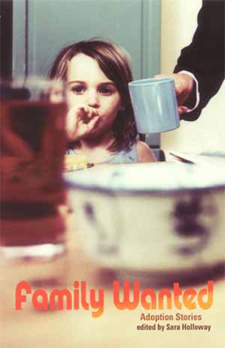Adoption is an emotive issue. Sara Holloway's collection of stories, Family Wanted, represents voices from the central players in any adoption, firstly from children, then birth mothers and finally adoptive parents. There is much that is common between the stories but just as much that is particular to the situation, the era, the country, the family, the reasons behind the adoption or the decision to search for the lost relative.
The content arrangement is a bit heavy-handed, as we are asked to see things from just one perspective at a time, denying the reality of adoption, which is the interplay of multiple perspectives whether we hear their stories or not.
At the heart of so many of the stories is sex, the act which begins a life, sometimes unplanned or unmanageable, and sometimes leading to a person relinquishing the child once born. For adopted children particularly, the mechanics of how they came to be are almost as essential as wanting to know why they were given up.
In the past nobody asked such questions but the mystery and shame surrounding adoption has thankfully gone. These days people may readily know why one set of parents handed them over and another set picked them up. They may locate one or both of their original parents to answer the unknowable questions of who they look like, what idiosyncracies they will inherit, where they belong. They may regret it when they do.
It is a fact that the babies once offered for adoption are now sometimes kept but are usually aborted. This is a tragedy for the children who never get to be born and a great sadness for childless couples whose chance at parenthood is already so limited.
Modern adoption tends to be intercultural and philanthropic, and by its nature very expensive, with the focus now on those seeking to adopt children from poor, disadvantaged situations, rather than on the parents who gave them up, either from poverty, war or early death. Holloway's collection contains several stories of Western parents visiting a foreign culture, saving a child from a miserable life of want.

What will happen when these children demand answers to their life-defining questions? They may find their way back to their original culture, but probably never to their first family.
Family Wanted captures the pain inherent in the adoption triangle, although seems to reflect more happy endings than real life will allow. Those close to adoption know that neat solutions don't come easily. My husband was adopted and sought to find his birth mother after the death of his adoptive parents, his real parents. His investigation revealed a grandmother, a reticent mother, two apathetic half-brothers and a broad extended family. His father is still unknown to him, perhaps dead, perhaps a casualty of his birth mother's denial. He got some answers. There is no real ongoing contact. Each year on his birthday he wonders if his birth mother remembers. One wonders how she could forget.
Even for those without personal experience adoption Family Wanted grants access to the intimate workings of other people' families (endlessly fascinating to students of life) each dealing with the fundamentals; Who am I? Is family just DNA? What makes me important? and coming up with different answers.
These things are sure: no matter where we have come from, we need to know who we are, who cares for us, to whom we are related, and ultimately, we must know where we are going.






















